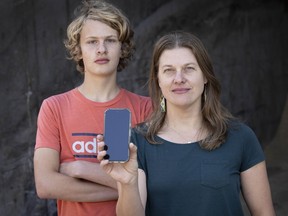B.C. banned cellphones in schools. Why do students need them to do their classwork?
B.C.'s "no-phone" policy is accompanied by an expectation that students will have a phone, says one parent.

Article content
Heather Pauls Murray knew cellphones were restricted in B.C. schools, so she was surprised when her son needed one to do his school work in class.
Murray said her son Hamish recently came home from his Chilliwack high school “frustrated and annoyed.” In order to do his assignments, he was expected to download apps and use Microsoft Teams for group work. For the only kid without a phone in several of his Grade 9 classes, “it was a scramble as teachers tried to find a way to include him.”
In a post on social media, Murray said she was “baffled” because her son’s school has a no-phones policy. Her friends responded with stories about their children being required to use phones to track lap times in gym class, or take photos of math homework because teachers didn’t hand out worksheets.
The confusion raises questions about the provincial government’s efforts to restrict cellphone use in B.C. schools and how the ban actually plays out in the classroom.
For Murray, the decision not to get Hamish a smartphone was the result of research and personal values. Murray’s husband is a computer scientist and she uses technology in her work and personal life. But they decided they want their three children to be “more present”.
“It’s hard enough as a 42-year-old woman to stay off my phone,” she said. “Having a device in your pocket creates such a huge temptation to use that to fill your time.”
While Murray allows her kids to play videogames and watch YouTube, she encourages them to connect with friends in person and spend time pursuing hobbies and sports.
She had planned to get Hamish a basic phone as he entered high school so he could be in contact about pickup times. He had never asked for a smartphone.
“Hamish is our oldest child, so this is definitely a new frontier for me,” she said. “We’re trying to introduce tech as a valuable tool, while making space for friendships in real life and plenty of time in nature.”
The B.C. government had the same aims when it restricted cellphones in schools at the start of the last school year.
“A restriction on cellphones is to make sure that kids can be kids and can learn and can develop strong social relationships with their friends at school in the absence of these devices,” B.C. Premier David Eby said in August 2024.
To do that, the B.C. government required every school district in the province to have a policy on digital devices. As a result, there would be some variation between school boards, said the premier, “but the bottom line is that the phones are not going to be out in the classroom.
“They’re not going to be out in the hallways, not going to be out in the schoolyards. It’s a bell-to-bell restriction on cellphones, recognizing that there are some kids with disabilities that may require access to a phone for an accommodation of some kind.”

In a statement, the Chilliwack school district said its policy requires students to silence their devices and store them in a designated space during instructional times.
But it also says “teachers will decide if students can use their cellphones or digital devices during class time for educational purposes.”
In cases where a student does not have a device, the school will provide one.
Murray said her son’s school found a tablet for him to use. But she feels the situation raises equity issues.
“Kids who might not have a phone because their parents need to spend that money on groceries or housing could feel very singled out,” she said.
Asked if a device is a requirement for students to complete their assignments, the district said students “wouldn’t be expected to do homework on a cellphone.” If there are barriers to accessing technology, schools work directly with students to address them, it added.
School counsellor Calvin White said the refusal to act with “completeness and commitment” on the use of cellphones in schools has created a situation where the ban is little more than a rule to be broken.
“Kids will use it whenever they can get away with it,” he said, “and no teacher wants to be the one getting kids in trouble for it.”
He said many kids show signs of addiction to their phones.
“You can’t learn to use it responsibly when you’re already addicted to it. Your mind is already wired to use it in a certain way.”
White questioned if “responsible usage” is even possible in the classroom, as he has seen students at a school in the Okanagan struggle to focus in class and engage with the material they’re learning.
But University of B.C. education professor Ron Darvin said it is important for schools to teach digital literacy in a world where technology is deeply integrated in daily life.
In the classroom, phones can aid learning, such as translation apps or games to help with math facts, as well as foster collaboration, he said. But perhaps more meaningfully, they can be used to teach kids to verify information and recognize misinformation.
However, Darvin, a professor in the department of language and literacy education, also recognized the “tension” that comes with the use of cellphones.
“We want students to be able to use the phones in a way that aids education, but doesn’t prevent them from interacting with the people around them,” he said.
He said teachers should be very clear about the purpose of using technology before allowing students to take out their phones.
For Murray, there is an irony to having a prominent “no-phone” policy that is accompanied by an expectation that students will have a phone.
“It’s like rule one, no phone. Rule two, teacher decides if you can use your phone,” she said.
In one of her son’s classes, the teacher asked students to put their phones in a box at the front of the room. He confronted the class after counting one less phone than expected.
“My son had to put up his hand and explain that he didn’t have a phone,” said Murray. “My kid is pretty confident, so it wasn’t a big deal. But this was the first day of high school, and another kid might have been mortified.
“I was just so surprised at the expectation.”














Postmedia is committed to maintaining a lively but civil forum for discussion. Please keep comments relevant and respectful. Comments may take up to an hour to appear on the site. You will receive an email if there is a reply to your comment, an update to a thread you follow or if a user you follow comments. Visit our Community Guidelines for more information.